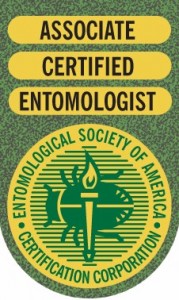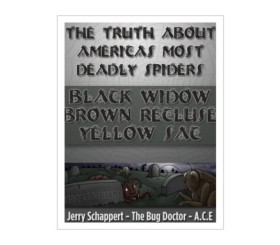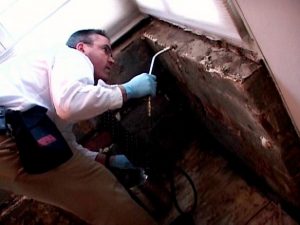 In my line of work I get a lot of people asking me; “Aren’t you afraid of poisoning?” or my favorite, “Aren’t you worried you’ll get cancer from all those chemicals?” While I’m sure there’s a smidgeon of compassion in their voice, most often what I hear is fear. Not for me but rather for them because I just treated their home.
In my line of work I get a lot of people asking me; “Aren’t you afraid of poisoning?” or my favorite, “Aren’t you worried you’ll get cancer from all those chemicals?” While I’m sure there’s a smidgeon of compassion in their voice, most often what I hear is fear. Not for me but rather for them because I just treated their home.
Sadly there are a lot of misconceptions about pesticides and human health. To most, all chemicals are bad and eventually you will die from their use. Almost everybody I meet knows somebody who knows somebody whose uncle’s wife’s brother’s son had pesticide poisoning and DIED. This anecdotal hear say evidence is all they need to be convinced that I am spreading toxic poisons about the home and that breeds worry, doubt and fear.
No amount of reasoning will sway the minds of those who carry this fear to any degree and all they need is a 20/20 report on TV about ‘toxic waste’ or something for it to be burned into their psyche forever. You can’t sight enough statistics or point out the facts about the exhaustive research and development of today’s products and make any headway.
These same people with the elevated fears are usually the same ones with dozens of pest control products haphazardly strewn about their sheds or garages. For some reason that’s ok and they have little regard thinking these store bought products can’t possibly be as strong and therefore are nothing to worry about. It’s only when an exterminator with the fancy tanks and tool belt comes strolling up the sidewalk that these phobias kick in.
Now I’m not here to tell you that pesticides are totally harmless and you should have no fears at all while dealing with them. Quite the opposite is true; However I would exchange the word fear for respect and tell you that you should have a lot of that.
A quick lesson for anyone who is dealing with any pesticide may be all the difference between safely applying a product or someone who may get hurt or sick.
Read the label:
It may sound simple and almost condescending but you must take the time to read what you’re getting in to or you have no one to blame but yourself. In the label you will find what to wear to protect yourself, how much product to mix and or use and the different bugs it will control. You will
also see one of 3 words which will help remind you what you are dealing with.
Caution: mildly toxic, more than an ounce would be a lethal dose for a human (less for children).
Warning more toxic, a teaspoon to a tablespoon is a lethal dose for an adult.
Danger (accompanied by the symbol of the skull and crossbones), highly toxic – a minute amount can kill an adult.
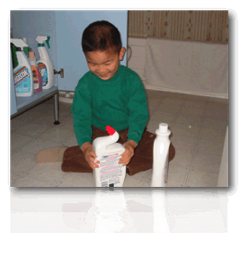 A quick read can help prevent you from becoming a statistic and your professional pest control operator has done more than 1000 reads if they’ve been in the industry for any length of time. When I first started in pest control 25 years ago I did not get the keys to my truck for 3 solid months. I read books, watched films, trained in the field and took proficiency tests before I was deemed ready to take on a route. While this may not always be the case I can assure you that this is at least similar to what the good companies do today. (I know mine does)
A quick read can help prevent you from becoming a statistic and your professional pest control operator has done more than 1000 reads if they’ve been in the industry for any length of time. When I first started in pest control 25 years ago I did not get the keys to my truck for 3 solid months. I read books, watched films, trained in the field and took proficiency tests before I was deemed ready to take on a route. While this may not always be the case I can assure you that this is at least similar to what the good companies do today. (I know mine does)
If you Google pesticide poisonings you would have to search a lot longer and harder than I to find exterminator related accidents. Most involved vehicle crashes or out of the ordinary circumstances. However I did find a common theme when it came to poisonings in the U.S. It may cause you to reorganize what’s under your sink and perhaps you’ll re evaluate doing pest control yourself.
Liquid dish soap is the leading cause of poisonings in the home for children under the age of six (over 2.1 million accidental poisonings per year). Most brands of liquid dish soap contain Formaldehyde and ammonia.
Of the chemicals found in personal care products: 884 are toxic, 146 cause tumors, 218 cause reproductive complications, 778 cause acute toxicity, 314 cause biological mutations, 376 cause skin and eye irritations
[Source: United States House of Representatives Report, 1989]
Out of 2,435 pesticide poisonings in a one-year period, over 40% were due to exposure to disinfectants and similar cleaning products in the home.
[Source: State of California Study]
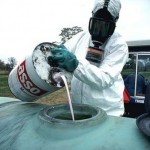 While fear of the dreaded insecticide reigns supreme it hardly registers with any statistical reporting service when it comes to pesticides. The overwhelming danger lies in homecare products or things we take completely for granted and use every day. Hypothetically if you could limit pesticide use to only trained professionals I doubt you would have very many accidents at all.
While fear of the dreaded insecticide reigns supreme it hardly registers with any statistical reporting service when it comes to pesticides. The overwhelming danger lies in homecare products or things we take completely for granted and use every day. Hypothetically if you could limit pesticide use to only trained professionals I doubt you would have very many accidents at all.
The death or harm to anyone from pesticides is tragic and I in no way wish to diminish its significance. But I believe most if not all of it could be eliminated with a little respect.


